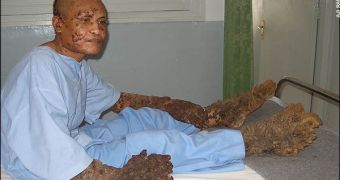Remember the case of Dede Koswara, 35, the Indonesian man nicknamed "Tree Man of Java", highlighted by the Discovery Channel? The man had an infection with human papillomavirus (HPV), a common human virus, known to cause warts and cervical (uterine), larynx, esophagus, oropharyngeal (throat, tonsils and back of the tongue), periungual skin, vulva, vagina, penis, perianal and anus cancer. Mild strains cause only benign warts, but Dede's weak immune system could not control the infection. The man has two rare mutations that rendered inactive CD4 immune white blood cells controlling the warts' growth. His whole body got covered with tree-like growths called "cutaneous horns".
Amazingly, with all his impaired immune system, Dede and his kids have enjoyed good health. The immunity mutations are believed to be present in less than 200 people worldwide.
The warty "roots" started developing themselves out of his arms and feet after he accidentally cut his knee when he was 15, and spread chaotically over his body, leaving him incapacitated, unable to do everyday household tasks. And they were heavy, growing by 5 mm per month. Dede had tried to cut them off, but they grew back even faster!
Jobless and abandoned by his wife, Dede had to raise by himself his two children in poverty. He joined a local "freak show" to earn a living, being presented in front of the paying audience alongside other cases of odd conditions, being the victim of abuse and ridicule. Indonesian doctors could not cope with his case, but Dede's relief came from Dr Anthony Gaspari of the University of Maryland.
Doctors have removed, in two operations (made in January and March), nearly 4 lbs (2.2 kg) of horny wart tissue off his body. For the first time after a long time, Dede can hold a pen and play sudoku. He can once more use his hands, walk without pain, and even punch numbers into a telephone for chatting with his friends. Skin from Dede's back and thigh will be grafted onto damaged areas, allowing Dede a better movement in his fingers.
"What I really want first is to get better and find a job. But then, one day, who knows? I might meet a girl and get married," said Dede.
Two more surgeries will remove more growths from his face, hands and feet, in the next three months. The main issue is that the warts could grow back. Synthetic Vitamin A could stop the development of Dede's formations, as it works in severe HPV infections. The vitamin A tablets boost Dede's immune system, and Dr Gaspari wants to achieve for Dede expensive anti-viral medicine available only in the US.
"There is still a high risk that there will be a recurrent growth of warts. So far, though, there has been some thickening of the skin, but no recurrent warts. Dede is very happy. Hopefully he will be able to socialize and work again," said Dr Rachmat Dinata, the skin specialist leading the Indonesian doctors.

 14 DAY TRIAL //
14 DAY TRIAL //